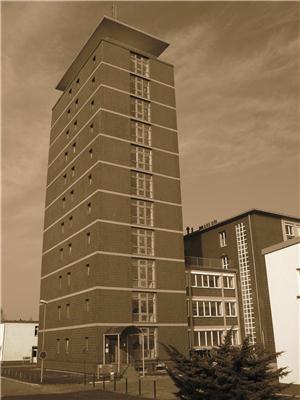The Joint European Stable Isotope User Meeting (JESIUM) for 2012 is to be held in Germany from September 2 to 7 at the Leipziger KUBUS conference center at the Helmholtz Centre for Environmental Research (UFZ). Participants to the conference comprise 250 international scientists from 22 European countries as well as United States, Canada, Brazil and Australia.
 The today's UFZ guest house had been used as 40m column tower for stable isotope separation from 1959-1990. Photo: Norma Neuheiser/UFZ
The today's UFZ guest house had been used as 40m column tower for stable isotope separation from 1959-1990. Photo: Norma Neuheiser/UFZ
The conference is a forum for participants to share their techniques and applications employing stable isotopes. The first JESIUM conference was organized in 2004 and is held once in 4 years. The purpose of the conference is to forge better interactions between European isotope researchers. This year’s conference is being hosted by the German Association of Stable Isotope Research with an aim to forge stronger alliance with partner entities from UK, Austria, Benelux, France and Eastern Europe. Doctoral students will be trained at Leipzig from September 10 to 14 subsequent to a meet on September 7 and 8.
Isotopes are atoms from the same chemical element but consist of different number of neutrons in the atomic core. Isotopes are essentially of two types, namely, stable and radioactive or unstable isotopes. Stable isotopes have numerous applications like medicine and natural sciences. Using stable isotopes, it is possible to determine the origin of substances, the evolution process of carbon dioxide concentration at the South Pole, the effectiveness of drugs and the ability of microorganisms to breakdown contaminants in water and air. Stable isotopes are thus valuable tracing tools for environmental researchers.
The Leipzig Science Park has been engaged in the research of stable isotopes for the last 50 years. Since environmental changes result in changes in the dynamics between different stable isotopes, they can be applied in the re-enactment of climatic history.